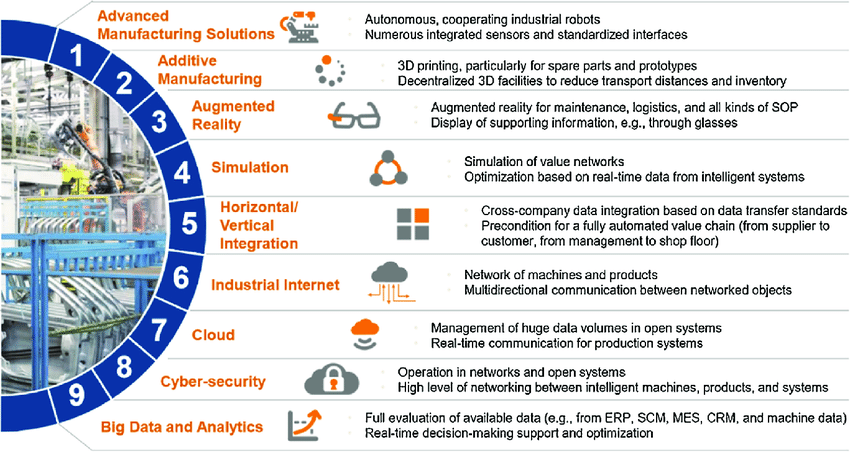As we’re Navigating into a new era of digital – where the lines that divide our physical, biological and digital worlds will likely diminish, industry 4.0 is going to change everything -- how we work, interact, buy, sell and think.
The question is – how well we are prepared to survive and thrive in this new – absolutely changed and data-driven world. IoT is going to bring that massive revolution in all the spheres of our professional and personal worlds. It is going to be all about sense, predictions, automated deliveries and machine intelligence to improve the experiences every time. This simply means an overhaul in the way businesses operate today – across industries. The manual and analogue went to a toss quite long ago though, the Industrial Revolution 4.0 is drifting the world towards purely machine-enabled industries – smart manufacturing, automated supply chain, self- driven cars, hyper-customized healthcare tools and medicines, and hyper-personalized buying experiences in retail.

Are we still assuming these as things of the future? These revolutions and disruptions are closer than they appear. We need to lead a disruption or shield against the next one now. No third choice. And quite frankly in this it is the leaders who have had the biggest of disruptions in their ways of thinking, delivering and inspiring. From the challenges of proving an equal excellence in remote leadership to the perquisites of matching their mind-sets with those of leaders in the IT industry—leaders across industries are riding the roller coaster every day. Isn’t it?
But there is more to come. This statement holds much more relevant now – you become digital or be ready to phase out.
Leadership in the new age not just demands a high degree of flexibility and emotional intelligence – but also expects leaders to show an extra-ordinary promptness in embracing even the most complex digital tools, practices and systems. They need to set examples of these 360-degree adoptions to lead in the 4th Industrial Revolution. The plate is still going to be full. It is the leader who is expected to guide other and figure out a new way on how to be the best, how to be efficient and how to have maximum productivity by continuously evolving and adapting new ways and techniques. It’s definitely a challenging task to accomplish because when it comes to productivity and efficiency, it’s always a challenge for the business landscape. From network efficiencies to human constraints of delivering as per estimates, everything together brought about the productivity challenges.
As we navigate through the changes in Industry 4.0, it may turn out to be a new age of productivity and efficiency- both at individual and organizational levels.
By bringing real-time information from users and internal suppliers to finding meaning insights behind those numbers and identifying powerful solutions - businesses across industries can improve efficiencies in a much better way. Cognitive computing is a robust promise here. This technology simulates human thought processes in a computerised model. The machine gets trained to think like humans-- proving a great assistance.

Besides, in the age of “data-overload”, industry 4.0 will see organizations - that show agility-leveraging smart filters. These filters will help identify what data is most useful and what is just the noise. B2C industries such as Healthcare, Education and Banking, investment in IoT and cloud tech will be an important decision to boost performance. Let’s see how the healthcare and banking sector is dealing with the situation.
We can’t overlook the overhaul in the Healthcare sector. These promises look quite close to reality since they come through an interdisciplinary approach that focusses entirely on – performance enhancement, 100% automation of selected interventions, and effective data management and access.
What can we expect for patients and healthcare providers:
● Reduced inventories as data is stored, managed and retrieved centrally.
● Effective control processes for complex interventions such as surgeries.
● Minimal scope for paperwork and hence, jumbling up of diagnostic reports.
● Reduced diagnosis cycle for chronic diseases through faster availability of patient history
● Overall automation of important functions in hospitals – bringing down costs, optimizing treatment delivery.
A breakthrough in medical imaging, precision in surgeries, waste recycling and management, patient information analysis, robotic surgeries, digital accuracies, etc will add value through IoT sensors, Cloud and Cognitive Computing, and Advanced AI-based Analytics. Efficiencies are on the cards for sure.

BFSI also along with other sectors are re-imagining and reforming quickly to navigate through a whole new world post Covid. Well, needless to say this sector has shown the greatest early signs already, though there is a lot that unfolds and demands an adoption in no time. Banks have reported a record spike in mobile app adoption throughout the Covid period. However, the IR demands more extensive leverage of the technologies – that ultimately take performance and customer experience to the next level of excellence.
Crypto banking systems can prove to be a prominent example here. Overall, we could call it a win for the banking and finance sector in Industry 4.0 if they reflect:
- Accelerated and simplified transaction processes - Optimized and hence reduced costs to customers - Minimal involvement of human engineering - Remarkably reduced operational costs - Zero fund leakages - 100% transparency to customers
Undoubtedly, the world is rapidly moving towards a fast, technology drive and more challenging world and Industry 4.0 is the new face for this.
Please share your views by a like and comment on LinkedIN Article

